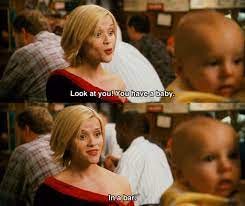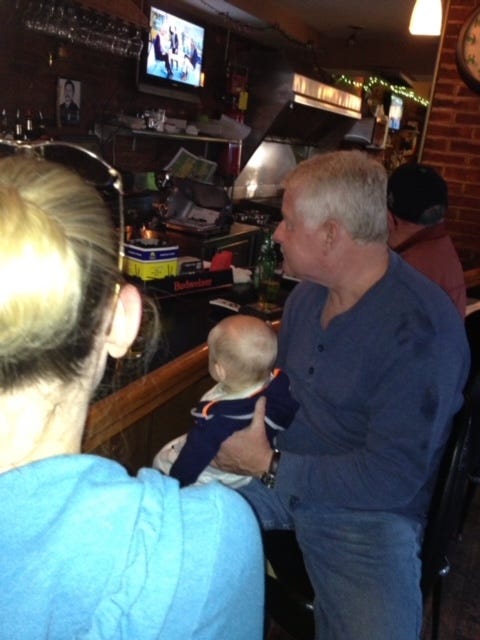
“It does not matter whether I want to be changed, because I am changed.” -- Chimamanda Ngozi Adichie, Notes on Grief
There are only a handful of photos that include both me and my father together: one on a farm in Kentucky when I was 12-ish, one on my wedding day, one a few months before he died.
There are even less photos of my son and my father together. The one that sticks out is a photo of my father on a barstool at the family bar, my three-month-old son on his lap. I’m standing on the edge of the photo, back to the camera, in a blue hoodie that I still own. And even though I can’t remember what I was thinking in that instant, I know I was not thinking that it was weird to have a baby in a bar. Because when bars are part of the family business, where else would you take your baby to meet his biological grandfather for the first time?
If it’s possible to grieve for a person in the same moment that they sit across from you, maybe that’s what I felt when the photo was taken. Maybe that younger version of me, a new mom in a blue hoodie, knew there would never be another moment exactly like that one. It was just an instant in South Baltimore, on the corner of Fort and Covington, and then it was gone. The memory now feels muddled, caught between something that might either be ordinary or spectacular.
Photos contain an undeniable power for many of us, the captured moment, the stillness of memory. This is true especially for “visual learners” who respond acutely to visual stimulation. But what I like about photos is how they never tell the whole story. There are people just outside the frame. There are smells and sounds the camera can’t capture. There is Before and there is After.

Why stare at sad photos? Because they weren’t always sad. Why write about loss? Because loss means there was once something there to lose.
In her essay, “The Unexpected Gifts of Writing About Grief,” Jacquelyn Mitchard says, “When my husband died, a friend said to me, you can’t outrun grief and you can’t avoid it. You are going to have to really grow close to grief; go right up and put your face against it. I did that through my writing.”
This is not to say that writing is the same as therapy (that is a topic to be explored later). Rather, writing through grief can help us see our world clearly, as if looking through one clean, un-smudged circle on an otherwise dirty window.
Or as a student said to me this week, it’s like we’re all sponges, walking around all day, sopping up life’s messes, absorbing all of the world’s spills. Then, when we write, we wring ourselves out. We let it go.
For me, looking again at the image of my dad and my son on a barstool feels like that, like wringing out forty years of bar stories. There’s the sticky floor and the pool table. There’s the smoke in my hair, ABBA on the jukebox.
I cling to the parts I remember. I mourn for the pieces that I forget.
This is where my Teacher and Bookworm selves come out to play. At the bottom of every new post, I’ll share what I’m currently reading and offer up a writing prompt if you feel so inclined.
Current reading: Dear Memory: Letters on Writing, Silence, and Grief by Victoria Chang
Favorite Substack for Writing Exercises and Book Talk: Writing Exercises from Matt Bell
Favorite Short Story of the Week: “Silver Blue Ripple” by Natalie Sypolt (in Still: The Journal)
Writing Prompt for your Mourning Pages:
Choose a photo that sparks an immediate reaction, especially related to loss and grief. Even better if several reactions and emotions come to the surface (more fodder for your writing).
Give the photo a title. Catalog the factual details (names, place, dates, etc.)—whatever you have access to. Then take a break.
This is the hard part. Come back to the photo later with fresh eyes and begin writing. What will you write? I like to pretend I’m describing the photo to someone else so that there is a built-in audience in mind. See where that storytelling takes you. And don’t be afraid to veer off track. Sometimes the best stuff lives in the tangents.
Please feel free to share what came up for you in the Comments (or not). We’ll be looking at this writing prompt in much more detail next week with guided questions and my own shared examples.






"I cling to the parts I remember. I mourn for the pieces that I forget."
This is beautiful. Thanks for this post.
My grandfather used to take me to the bar where he cleaned up. He taught me how to shoot pool and I could drink from the soda machine. It's a warm memory, but tinged with sadness, as he died from alcoholism. Decades later, I still miss him.
Thank you 🙏 I have the best friend & daughter in the world!!!!